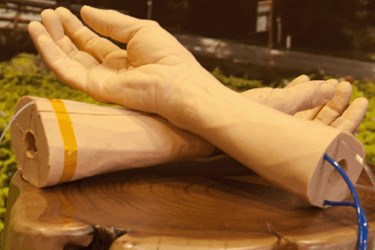Google Develops Synthetic Skin To Test Cancer-Detecting Wearable Device
By Jof Enriquez,
Follow me on Twitter @jofenriq

Google researchers recently unveiled a project to develop a wristband that can detect cancer cells when they first appear in circulating blood. As part of the project, researchers created dummy arms with synthetic human skin to help test the device's effectiveness. Specifically, they are trying to determine how the Fitbit-like device would interact with nanoparticles that attach to cancer cells.
Dr. Andrew Conrad, head of Google Life Sciences, explained in an interview with The Atlantic that the wristband system would involve swallowing a pill containing nanoparticles with specific markers that attach to cancer cells. When cancer cells bind to the nanoparticles, they fluoresce, or light up. As they circulate through veins in the wrist (where blood vessels are closer to the surface), the clumps of fluoresced cancer cells would be attracted to wristband magnetically, and would be visible through the skin.
The dummy arms are being used to test how the light is transmitted through human skin. The research teams used different types of "skin" based on ethnicity, thickness, skin tones, and other factors.
"At this point, Google believes the cancer-detecting nanoparticles can be coated with antibodies that bind with specific proteins or cells associated with various maladies. The particles would remain in the blood and report back continuously on what they find over time," Conrad told ABC in an interview last year. "We want to make it simple and automatic and not invasive."
However, it could be a while before the technology makes the jump from Google's research labs to the marketplace. When asked in the Atlantic interview how far along the research is, Conrad replied, "We're making good progress, but the journey is long and hard. So I think we will get there. And I hope its years, not decades."
Privacy is a major concern. When reminded in the interview that people may find it strange to have nanoparticles being tracked inside their bodies, Conrad said, "It's way weirder to have cancer cells floating through your body that are constantly trying to kill you."
Google is tying in this nanoparticle study with another health project that aims to map out the perfectly "healthy" human body. Dubbed the Baseline Study, the Google project is monitoring physiologic, genetic, and molecular information from 175 anonymous participants, according to a previous Med Device Online story. The project aims to unearth new biomarkers that could be exploited to diagnose and detect diseases like cancer at their early stages.
"We're trying to change medicine from being episodic and reactive, like going to the doctor saying ‘my arm hurts,' to being proactive and preventative," Conrad told The Atlantic.
Conrad and his team at Google Life Sciences is part of Google X — Google's experimental research and development department. It is the same unit that developed a smart lens technology that detects glucose in tears.
